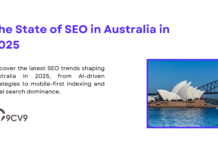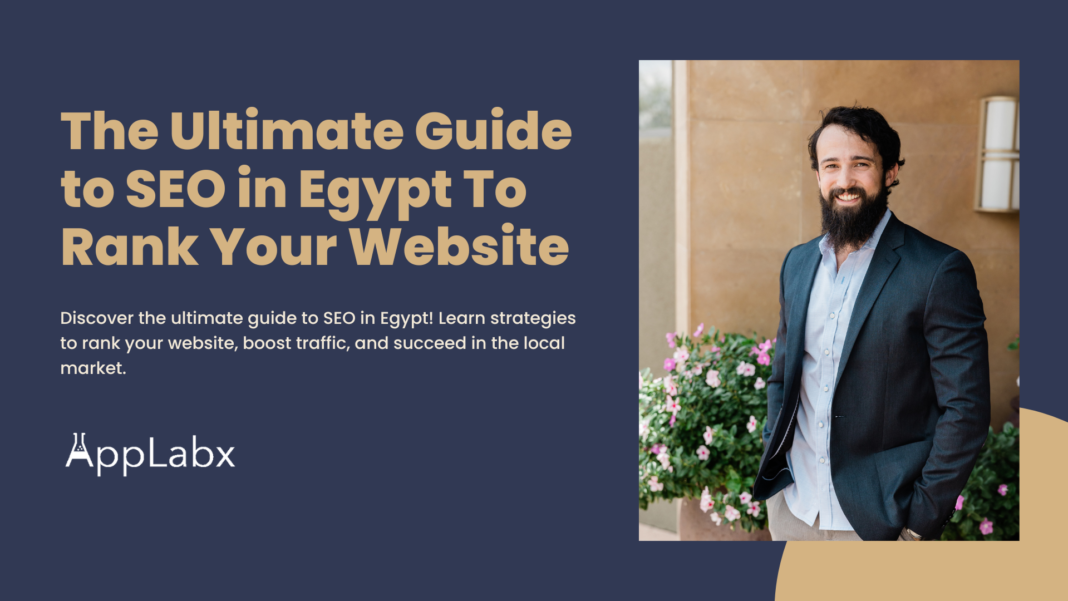Key Takeaways
- Local SEO is Essential: To succeed in Egypt’s competitive digital market, optimize your website with location-specific keywords, Google My Business listings, and region-focused content.
- Cultural and Linguistic Relevance Matters: Tailor your content to Arabic-speaking users and consider cultural nuances to better connect with Egypt’s diverse audience and improve engagement.
- Mobile Optimization is Key: With high mobile internet usage in Egypt, ensuring your website is mobile-friendly and optimized for fast loading speeds is crucial for higher rankings and user experience.
In today’s digital age, the internet has become the cornerstone of how businesses operate, communicate, and grow, especially in a competitive market like Egypt. With millions of Egyptians turning to search engines daily to find products, services, and information, having a robust online presence is no longer optional—it’s essential. Search Engine Optimization (SEO) is the key to unlocking this potential, ensuring that your website not only stands out but also ranks high on search engine results pages (SERPs).

The Egyptian digital market presents a unique blend of challenges and opportunities. With over 75 million internet usersand a steadily growing e-commerce sector, businesses have an incredible opportunity to reach a vast and diverse audience. However, the dynamics of SEO in Egypt differ significantly from global markets due to language preferences, cultural nuances, and distinct user behaviors. From optimizing Arabic content to catering to mobile-heavy users, SEO strategies in Egypt must be tailored to address these specific factors.
But why is SEO so crucial for businesses targeting the Egyptian audience? It’s simple—visibility drives growth. Whether you’re a local retailer in Cairo, a service provider in Alexandria, or an e-commerce platform serving nationwide, appearing on the first page of search results can significantly boost your brand visibility, organic traffic, and revenue. In a country where online searches often influence purchasing decisions, not investing in SEO means missing out on a massive slice of the digital pie.
This comprehensive guide is designed to provide businesses, marketers, and website owners with the insights they need to succeed in the Egyptian market. From understanding the local digital landscape to mastering technical SEO, local SEO, and content optimization, you’ll learn actionable strategies to help your website climb the rankings.
Whether you’re just starting your SEO journey or looking to refine your existing strategies, this guide will empower you with the tools and knowledge to thrive in Egypt’s online marketplace. Let’s dive into the ultimate roadmap for dominating SEO in Egypt and positioning your website as a leader in your industry.
But, before we venture further, we like to share who we are and what we do.
About AppLabx
From developing a solid marketing plan to creating compelling content, optimizing for search engines, leveraging social media, and utilizing paid advertising, AppLabx offers a comprehensive suite of digital marketing services designed to drive growth and profitability for your business.
AppLabx is well known for helping companies and startups use SEO to drive web traffic to their websites and web apps.
At AppLabx, we understand that no two businesses are alike. That’s why we take a personalized approach to every project, working closely with our clients to understand their unique needs and goals, and developing customized strategies to help them achieve success.
If you need a digital consultation, then send in an inquiry here.
The Ultimate Guide to SEO in Egypt To Rank Your Website
- Understanding the SEO Landscape in Egypt
- Core SEO Elements for Egyptian Websites
- Leveraging Local SEO in Egypt
- Adapting to Cultural and Linguistic Nuances
- Challenges and Solutions for SEO in Egypt
- Measuring Success: SEO Analytics and KPIs
1. Understanding the SEO Landscape in Egypt
To effectively rank a website in Egypt, it’s essential to understand the local digital ecosystem. SEO strategies that work in global markets need to be adapted to align with the unique characteristics of the Egyptian online landscape. This section explores the core aspects of Egypt’s SEO environment, providing key insights to optimize your efforts for success.
The Digital Market in Egypt
The Egyptian market is one of the largest in the MENA region, with significant opportunities for businesses to tap into a growing audience.
Internet Usage Statistics
- Egypt boasts over 75 million internet users, making it the largest online market in the Arab world.
- Mobile devices dominate, with over 90% of users accessing the internet via smartphones.
- High engagement on platforms like Facebook, Instagram, and YouTube indicates a preference for multimedia content.
Popular Online Behaviors
- Egyptians use search engines for a wide range of queries, from shopping to finding local services.
- Localized searches are common, with phrases like “near me” or city-specific queries (e.g., “restaurants in Cairo”).
- Growing interest in e-commerce due to increased trust in online payment systems and delivery services.
Example: An e-commerce website selling electronics can target high-ranking keywords such as “best smartphones in Egypt” or “affordable laptops in Cairo” to attract local buyers.
Key Search Engines in Egypt
While Google dominates globally, understanding its role and competitors in Egypt can refine your SEO strategy.
Google’s Dominance
- Google holds over 95% of the search engine market share in Egypt, making it the primary focus for SEO.
- Features like Google Maps and Google My Business are widely used for local searches.
Other Search Engines
- Bing and Yahoo have minor market shares but can still be relevant for niche audiences or international users accessing Egyptian content.
- Egypt-focused platforms or directories can also offer backlink opportunities to enhance local SEO.
Example: A tourism agency can optimize its Google My Business listing with keywords like “luxury Nile cruises” to rank higher in local searches for travel-related queries.
Unique SEO Challenges in Egypt
Understanding and addressing these challenges is critical for success in the Egyptian market.
Language and Cultural Nuances
- The majority of searches are conducted in Arabic, with a growing segment in English, especially among younger users.
- Colloquial Arabic (e.g., “عروض أسعار الموبايلات” for mobile phone deals) is frequently used in searches.
- Cultural preferences, such as avoiding taboo topics, must be considered in content creation.
Solution: Use keyword research tools to identify Arabic terms and incorporate them into meta tags, headings, and content while maintaining cultural sensitivity.
Technical Limitations
- Slow internet speeds in some areas necessitate lightweight website designs.
- Older devices require compatibility considerations for optimal user experience.
Solution: Optimize website speed using tools like Google PageSpeed Insights and prioritize mobile-first design to cater to Egypt’s smartphone-dominant audience.
Local SEO Opportunities in Egypt
Local SEO is essential for businesses targeting specific regions or cities in Egypt.
Importance of Google My Business
- Accurate NAP (Name, Address, Phone) details are critical for ranking in local searches.
- Regular updates to business hours, photos, and reviews improve visibility.
Example: A café in Alexandria can rank for “best coffee shop in Alexandria” by maintaining an updated Google My Business profile and encouraging customer reviews.
Localized Content Marketing
- Blogs, videos, and infographics tailored to Egyptian interests (e.g., Ramadan promotions) drive engagement.
- Addressing common pain points (e.g., “how to save on electricity bills in Cairo”) can boost organic traffic.
Example: A home appliance store can create a blog titled “Top 5 Energy-Saving Washing Machines in Egypt” to attract local buyers.
Building Local Backlinks
- Partnering with Egyptian bloggers, news sites, or niche platforms enhances domain authority.
- Engaging with local online directories (e.g., Dalili or Yellow Pages Egypt) improves credibility.
Example: A startup can collaborate with Egyptian tech blogs to review their product, gaining valuable backlinks and exposure.
Emerging Trends in Egypt’s SEO Landscape
Keeping up with trends ensures long-term success in the ever-evolving digital market.
Voice Search Optimization
- Increasing smartphone usage has led to more voice searches in Arabic.
- Queries often involve natural language (e.g., “what’s the nearest pharmacy?”).
Solution: Incorporate conversational keywords and question-based phrases into your content.
Mobile SEO
- Google’s mobile-first indexing aligns with Egypt’s mobile-heavy audience.
- Mobile-responsive designs and AMP (Accelerated Mobile Pages) enhance user experience.
Example: A local restaurant chain can optimize its mobile site to rank higher for “quick delivery pizza in Cairo.”
Understanding the SEO landscape in Egypt requires a blend of technical know-how, cultural awareness, and a keen eye on emerging trends. By leveraging localized strategies and addressing the unique characteristics of the Egyptian market, businesses can achieve higher visibility and sustainable growth online.
2. Core SEO Elements for Egyptian Websites
Optimizing your website for Egypt’s market requires a thorough understanding of key SEO elements that align with local user behavior, search patterns, and cultural nuances. From keyword research to technical SEO, each component plays a vital role in improving visibility and driving organic traffic. This section explores the core elements essential for creating an effective SEO strategy tailored to the Egyptian audience.
Keyword Research for the Egyptian Audience
Targeting the right keywords is the foundation of a successful SEO strategy. For Egyptian websites, understanding local search habits and preferences is crucial.
Key Considerations for Local Keyword Research
- Bilingual Searches:
- Egyptians commonly search in both Arabic and English.
- Example: “أفضل مطاعم القاهرة” (best restaurants in Cairo) vs. “restaurants near me Cairo.”
- Colloquial vs. Formal Arabic:
- Many users employ colloquial Arabic for informal searches.
- Formal Arabic may perform better for professional or academic content.
- Tools for Keyword Research:
- Google Keyword Planner: Helps identify high-volume Arabic and English keywords.
- SEMrush and Ahrefs: Useful for analyzing competitor keywords and regional trends.
Example: A travel website targeting Egyptian tourists can optimize for “رحلات الغردقة” (Hurghada trips) to capture Arabic-speaking audiences.
On-Page SEO Best Practices
On-page optimization ensures that your website content is relevant and accessible to both users and search engines.
Optimized Titles and Meta Descriptions
- Incorporate primary keywords in both Arabic and English.
- Keep meta descriptions concise, engaging, and tailored to Egyptian cultural contexts.
- Example:
- Title: “أفضل 10 أماكن سياحية في مصر | دليل السفر الخاص بك”
- Meta: “اكتشف أفضل الأماكن السياحية في مصر من الأهرامات إلى البحر الأحمر. خطط لرحلتك الآن!”
Header Tags (H1, H2, H3)
- Use Arabic or English headers based on your target audience.
- Ensure headers are keyword-rich and organized hierarchically.
Content Optimization
- Focus on high-quality, localized content that addresses user intent.
- Include relevant examples, statistics, and cultural references to resonate with Egyptian users.
- Example: A real estate website can create a blog titled “أفضل المناطق للعيش في القاهرة” (Best areas to live in Cairo) targeting potential homeowners.
Internal Linking
- Create an intuitive structure that links to related content within your site.
- Use descriptive anchor texts in Arabic or English.
- Example: A blog about Egyptian cuisine can link to a recipe page with “أفضل وصفات الكشري” (best koshary recipes).
Technical SEO Optimization
Technical SEO is vital to ensure your website functions seamlessly and ranks higher in search engine results.
Mobile-First Indexing
- With over 90% of internet users in Egypt accessing websites via mobile devices, mobile-first design is critical.
- Implement responsive designs that adapt to various screen sizes.
Website Speed
- Optimize website loading times to cater to areas with slower internet speeds.
- Tools: Use Google PageSpeed Insights to measure and improve performance.
Example: A local e-commerce platform can enhance mobile usability and speed to improve its ranking for “شراء الملابس أونلاين في مصر” (buy clothes online in Egypt).
Multilingual SEO
- Use hreflang tags to differentiate between Arabic and English pages.
- Ensure translations are accurate and culturally appropriate.
Structured Data
- Add schema markup for local businesses to enhance visibility in search results.
- Example: Add reviews and ratings for “مطاعم الأسماك بالإسكندرية” (seafood restaurants in Alexandria).
Content Strategy for Egyptian Websites
Engaging, localized content is the cornerstone of attracting and retaining Egyptian audiences.
Creating Localized Content
- Address specific interests, challenges, and trends in Egypt.
- Example: A tech blog can write about “أفضل الهواتف الذكية المناسبة للميزانية في مصر” (best budget smartphones in Egypt).
Multimedia Integration
- Egyptians prefer visual content such as videos and infographics.
- Leverage platforms like YouTube and Instagram to share engaging content.
Example: A travel agency can create a YouTube series showcasing “أجمل الأماكن السياحية في مصر” (the most beautiful tourist spots in Egypt).
User Engagement
- Encourage user comments and interactions by posing questions or offering polls.
- Example: An education portal can ask, “ما هي الكورسات الأكثر طلبًا في مصر؟” (What are the most in-demand courses in Egypt?).
Local SEO for Egyptian Websites
Focusing on local SEO helps businesses rank higher in city-specific searches.
Google My Business
- Claim and optimize your listing with accurate business details.
- Add photos, respond to reviews, and include Arabic keywords.
Example: A restaurant in Giza can optimize for “مطاعم قريبة مني في الجيزة” (restaurants near me in Giza).
Localized Backlink Building
- Collaborate with Egyptian influencers, blogs, and local directories.
- Example: A healthcare clinic can feature in local directories under “أفضل العيادات الطبية في القاهرة” (best medical clinics in Cairo).
Mastering these core SEO elements ensures that your website is optimized for the Egyptian market. By prioritizing localized content, technical optimization, and a user-first approach, you can enhance your visibility, attract more organic traffic, and drive conversions.
3. Leveraging Local SEO in Egypt
Local SEO is pivotal for businesses targeting Egyptian audiences, enabling them to connect with customers searching for services or products within specific regions. With Egypt’s highly urbanized and culturally diverse population, localized SEO strategies can help businesses thrive in cities like Cairo, Alexandria, and beyond. Below, we explore practical methods and actionable steps to optimize for local SEO in Egypt.
Understanding the Importance of Local SEO in Egypt
Why Local SEO Matters
- Growing Urban Population: Over 40% of Egyptians live in urban areas where local searches like “near me” queries are common.
- Mobile-Centric Search Behavior: With over 90% of internet users accessing search engines via mobile devices, local SEO aligns with location-based services.
- Cultural Relevance: Egyptians prefer businesses that understand and cater to their local needs, making localized content a strong differentiator.
Example: A restaurant in Zamalek, Cairo, can increase foot traffic by ranking for “أفضل مطعم في الزمالك” (best restaurant in Zamalek).
Key Elements of Local SEO for Egyptian Businesses
Optimizing Google My Business (GMB)
Google My Business (GMB) is a cornerstone of local SEO, offering tools to enhance visibility in Egypt’s competitive markets.
- Claim and Verify Your Listing:
- Use accurate NAP (Name, Address, Phone) details in Arabic and English.
- Ensure your listing includes keywords like “مطعم في الجيزة” (restaurant in Giza).
- Add High-Quality Photos:
- Showcase products, services, or the ambiance of your business location.
- Example: A café can upload images of their coffee selections and cozy seating areas.
- Encourage Customer Reviews:
- Respond to reviews in Arabic and English to build trust and engagement.
- Example: Thank customers for positive feedback like “أفضل قهوة تناولتها” (best coffee I’ve had).
Local Keyword Optimization
Using geo-specific keywords is critical to ranking higher for location-based searches.
- Use City or District-Specific Keywords:
- Target terms such as “فنادق رخيصة في الغردقة” (cheap hotels in Hurghada) or “خدمات تنظيف في المعادي” (cleaning services in Maadi).
- Blend Colloquial and Formal Arabic:
- Incorporate colloquial terms for casual audiences and formal terms for professional services.
- Tools for Keyword Research:
- Use Google Trends to identify trending local search terms in Egypt.
- Leverage Ahrefs to analyze competitors’ keywords targeting Egyptian regions.
Example: A home repair service can rank for “تصليح مكيفات في القاهرة” (AC repair in Cairo) by integrating the keyword into its service pages.
Localized Content Marketing
Content tailored to Egyptian interests and challenges builds trust and engagement with local audiences.
- Write Location-Specific Blogs:
- Create articles or guides focused on Egyptian cities.
- Example: A tourism company can publish a blog titled “دليل السفر الشامل إلى الأقصر” (A Complete Travel Guide to Luxor).
- Address Local Pain Points:
- Identify common concerns like traffic, rising costs, or local regulations.
- Example: A real estate agency can write about “أفضل الأحياء المناسبة للعائلات في القاهرة” (best neighborhoods for families in Cairo).
- Use Local Events and Holidays:
- Create campaigns or content around Egyptian holidays like Ramadan or Eid.
- Example: An e-commerce site can offer “خصومات رمضان” (Ramadan discounts).
Building Local Backlinks
Backlinks from reputable local sources strengthen your site’s authority in Egypt’s online market.
- Collaborate with Local Bloggers and Influencers:
- Partner with Egyptian food, travel, or tech bloggers to review your services.
- Example: A tech store can collaborate with a local YouTuber to showcase its latest gadgets.
- Engage with Egyptian Directories:
- Submit your business to platforms like Dalili, Yellow Pages Egypt, or Waseet.
- Ensure your directory profile includes localized keywords.
- Sponsor Local Events:
- Supporting community events or organizations can earn mentions and backlinks.
- Example: A fitness brand sponsoring a local marathon in Cairo can gain exposure and backlinks.
Technical SEO for Local Audiences
Mobile Optimization
- Over 90% of local searches in Egypt are conducted via mobile devices, making mobile-friendly websites essential.
- Use responsive design and test mobile usability with Google’s Mobile-Friendly Test tool.
Example: A bakery can ensure its mobile website loads quickly for “أفضل مخبز في الإسكندرية” (best bakery in Alexandria) searches.
Localized Schema Markup
- Implement schema markup to highlight your business information in search results.
- Example: Use LocalBusiness schema to display details like location, hours, and reviews.
Page Speed Optimization
- Optimize loading times to cater to regions with slower internet speeds.
- Use tools like PageSpeed Insights to diagnose and resolve speed issues.
Harnessing Social Media for Local SEO
Social media platforms are integral to Egypt’s digital landscape, offering opportunities to boost local SEO.
Platform-Specific Strategies
- Facebook:
- Create location-based ads targeting cities or neighborhoods.
- Example: A salon in Nasr City can promote its services with geo-targeted Facebook ads.
- Instagram:
- Use geotags and hashtags like #CairoLife or #AlexandriaFood to increase visibility.
- YouTube:
- Upload localized video content, such as tutorials or behind-the-scenes clips.
- Example: A local tailor can post a video titled “كيفية اختيار الزي المثالي للعرس” (how to choose the perfect wedding outfit).
Success Stories: Examples of Effective Local SEO in Egypt
- Example 1: A Local Restaurant in Cairo
- Optimized its GMB listing with Arabic keywords, photos, and active review management.
- Result: Ranked in the top 3 for “أفضل مطاعم في القاهرة” (best restaurants in Cairo).
- Example 2: An Alexandria-Based Travel Agency
- Published blogs like “أفضل رحلات يومية من الإسكندرية” (best day trips from Alexandria).
- Result: Increased organic traffic by 45% from location-based searches.
- Example 3: A Mobile Repair Shop in Giza
- Used schema markup for local business and integrated localized keywords.
- Result: Higher ranking for “إصلاح الهواتف في الجيزة” (phone repair in Giza).
Leveraging local SEO in Egypt allows businesses to connect with their target audience effectively and gain a competitive edge. By focusing on strategies like GMB optimization, localized content, and social media integration, you can achieve higher visibility and long-term success in the Egyptian market.
4. Adapting to Cultural and Linguistic Nuances
In Egypt, cultural and linguistic awareness plays a critical role in SEO success. Egypt’s unique blend of historical traditions, modern influences, and a bilingual population (Arabic and English) demands tailored strategies that resonate with local audiences. Businesses that effectively adapt their online presence to these nuances can build deeper connections and improve engagement.
Understanding Cultural Influences on Consumer Behavior
Egyptian Values and Preferences
- Family-Centric Messaging:
- Egyptians prioritize family, so campaigns emphasizing family values resonate deeply.
- Example: A grocery delivery app can target families with messages like “توصيل سريع لاحتياجات أسرتك” (fast delivery for your family’s needs).
- Trust and Authenticity:
- Egyptians value trustworthy businesses and often rely on word-of-mouth recommendations.
- Include testimonials, real customer reviews, and case studies in marketing materials.
- Religious Sensitivities:
- A significant majority of Egyptians are Muslim, so content should align with Islamic values.
- Example: Avoid alcohol-related ads or images during Ramadan and instead highlight Ramadan offers or products like dates and juices.
Seasonal and Holiday Considerations
- Key Holidays to Leverage:
- Ramadan and Eid: Create campaigns offering special discounts or gifts.
- Example: An e-commerce store could offer “خصومات رمضان” (Ramadan discounts) or promote Eid gift ideas.
- National Holidays and Events:
- Leverage Egypt’s National Day or popular sports events to create culturally relevant campaigns.
- Example: A clothing brand could launch a collection inspired by Egypt’s football team during major tournaments.
Tailoring Linguistic Strategies for SEO Success
Arabic Language Optimization
- Use Modern Standard Arabic (MSA):
- Egyptians are accustomed to MSA in formal communication.
- Example: For professional services like accounting, use “محاسبة الشركات في مصر” (corporate accounting in Egypt).
- Incorporate Colloquial Arabic:
- For casual or youth-oriented brands, include Egyptian colloquial phrases.
- Example: A café could use “قهوة ع المزاج” (coffee for your mood) to appeal to a younger audience.
- Focus on Keyword Localization:
- Research Arabic equivalents of English terms, including different dialects.
- Example: Instead of “best hotels in Cairo,” optimize for “أفضل الفنادق في القاهرة.”
Balancing Bilingual Content
- English for Professionals and Expats:
- Many Egyptians working in corporate sectors or expatriates search in English.
- Example: A real estate agency can create bilingual listings to cater to locals and expats.
- Hybrid Language Use:
- Mix Arabic and English for campaigns targeting millennials and Gen Z who frequently use “Arabizi” (Arabic written in English letters).
- Example: An online store could write: “أفضل Offers لشهر ديسمبر” (best offers for December).
Content Localization Examples
- Tourism Industry:
- A travel agency targeting international audiences should translate their site into both Arabic and English, ensuring cultural relevance.
- Example: Highlight Egypt’s landmarks like “الأهرامات في الجيزة” (the Pyramids in Giza) and use globally recognized English phrases for tourists.
- E-commerce Platforms:
- Use product descriptions tailored for Egyptian shoppers, blending local idioms.
- Example: A beauty product could be marketed as “لإطلالة مصرية ساحرة” (for a stunning Egyptian look).
Addressing Visual and Design Preferences
Cultural Relevance in Imagery
- Avoid Offensive Graphics:
- Avoid images that conflict with religious or cultural norms.
- Example: Use modestly dressed models in fashion ads targeting Egyptian audiences.
- Showcase Local Identity:
- Use visuals that resonate with Egyptian culture, such as iconic landmarks or traditional crafts.
- Example: A bank could incorporate images of the Nile or local markets in their marketing materials.
Design Considerations for Arabic Audiences
- Right-to-Left Layout:
- Arabic websites must accommodate the right-to-left (RTL) script.
- Example: Align menus, navigation bars, and content blocks from right to left for Arabic users.
- Readable Fonts:
- Use fonts designed for Arabic text, such as “Tahoma” or “Amiri.”
- Avoid overly decorative fonts that may hinder readability.
- Cultural Colors:
- Red, white, and black are prominent due to their presence in Egypt’s flag, while green signifies Islamic heritage.
- Example: A local event company could design posters in these colors to evoke a sense of patriotism.
Engaging Local Audiences with Personalized Campaigns
Hyperlocal Campaigns
- Target Specific Cities or Districts:
- Egyptians take pride in their regional identities. Tailor campaigns for cities like Alexandria or districts like Zamalek.
- Example: A delivery service could create separate ads for “التوصيل السريع في المعادي” (fast delivery in Maadi) and “التوصيل في الإسكندرية” (delivery in Alexandria).
- Community Involvement:
- Engage with local communities by sponsoring events or supporting social causes.
- Example: A clothing store in Cairo could donate to a local charity and promote it through their marketing efforts.
Incorporating Egyptian Humor
- Egyptians appreciate humor, especially in advertising. Brands can engage audiences through witty and relatable content.
- Use Popular Memes or References:
- Incorporate local trends to make campaigns more shareable.
- Example: A telecom company could create an ad using the phrase “كل دقيقة بتفرق” (every minute counts) during exam season.
- Highlight Daily Struggles with Humor:
- Relate to common Egyptian challenges like traffic or long queues.
- Example: A snack brand could say, “تقدر تستنى الزحمة بس ما تقدرش تستنى جوعك” (you can wait for traffic, but not your hunger).
Adapting to Egypt’s cultural and linguistic nuances involves understanding the country’s traditions, preferences, and bilingual dynamics. By blending localized language strategies, culturally relevant visuals, and hyperlocal campaigns, businesses can enhance their online presence and build meaningful connections with Egyptian audiences.
5. Challenges and Solutions for SEO in Egypt
Navigating the SEO landscape in Egypt comes with its unique set of challenges due to the country’s cultural, economic, and digital environment. However, understanding these challenges and implementing effective solutions can help businesses achieve SEO success in the region.
Challenge 1: Limited Digital Infrastructure in Some Regions
The Problem
- Uneven Internet Accessibility:
- While urban centers like Cairo and Alexandria boast widespread internet access, rural areas lag behind.
- Limited internet speeds and connectivity hinder access to online content in certain regions.
- Device Fragmentation:
- Many users in Egypt access the internet via older mobile devices with limited capabilities.
- This affects how websites perform, particularly if they aren’t optimized for low-end devices.
Solutions
- Optimize Websites for Mobile:
- Use responsive designs that adapt seamlessly to different screen sizes.
- Example: Compress images and use lightweight code to reduce loading times for mobile users.
- Focus on Lightweight Content:
- Prioritize mobile-first strategies, like AMP (Accelerated Mobile Pages), to ensure faster load times.
- Example: A local news website could implement AMP to reach readers in areas with slower internet connections.
- Consider Offline Strategies:
- Implement offline access features such as downloadable content or progressive web apps (PWAs).
Challenge 2: High Competition in Urban Markets
The Problem
- Crowded SEO Environment:
- Urban areas like Cairo are saturated with businesses competing for visibility in sectors such as e-commerce, tourism, and food delivery.
- Global Brands Dominating:
- International companies with larger budgets often outpace local businesses in organic search rankings.
Solutions
- Focus on Niche Markets:
- Identify underserved audiences or niche segments.
- Example: A local bakery can target hyperlocal keywords like “أفضل مخبز في المعادي” (best bakery in Maadi) to capture local traffic.
- Leverage Local SEO Strategies:
- Claim and optimize Google My Business listings with detailed information.
- Example: Include operating hours, contact numbers, and updated images to stand out in local searches.
- Utilize Long-Tail Keywords:
- Target less competitive, specific phrases.
- Example: Instead of “best restaurants in Cairo,” use “top vegetarian restaurants in Zamalek.”
Challenge 3: Cultural and Linguistic Nuances
The Problem
- Bilingual Audience:
- The need to cater to both Arabic and English-speaking audiences can complicate content creation.
- Dialects and Colloquialisms:
- Modern Standard Arabic differs from Egyptian colloquial Arabic, making it challenging to choose the right tone for content.
Solutions
- Create Bilingual Content:
- Use both Arabic and English versions of your website to appeal to a wider audience.
- Example: An educational platform could offer course descriptions in both languages.
- Incorporate Local Dialects Strategically:
- Use colloquial phrases in blog posts or ads targeting casual audiences, while using formal Arabic for professional contexts.
- Conduct Linguistic Keyword Research:
- Optimize for both Arabic and English keywords to cover all potential searches.
Challenge 4: Seasonal and Cultural Variations in Behavior
The Problem
- Seasonal Spikes in Search Trends:
- Consumer behavior shifts significantly during Ramadan, Eid, and the summer travel season.
- Cultural Sensitivities:
- Campaigns not aligned with local customs can alienate audiences.
Solutions
- Align Content with Seasonal Trends:
- Develop Ramadan- or Eid-specific campaigns to drive traffic during peak periods.
- Example: A travel agency could promote “رحلات رمضان المميزة” (special Ramadan trips).
- Create Culturally Respectful Campaigns:
- Avoid imagery or messaging that conflicts with religious or societal values.
- Example: A clothing retailer can highlight modest fashion lines during Ramadan.
Challenge 5: Lack of Local SEO Expertise
The Problem
- Insufficient Knowledge Among Businesses:
- Many local companies lack awareness of advanced SEO techniques like schema markup or content clustering.
- Dependence on Outdated Practices:
- Some businesses still rely on keyword stuffing or low-quality backlinks, which harm rankings.
Solutions
- Invest in Local SEO Training:
- Educate in-house teams or hire local SEO experts who understand the market.
- Example: An agency offering workshops tailored to Egyptian businesses could fill this gap.
- Focus on Quality Content and Backlinks:
- Develop original, high-value content that attracts organic backlinks.
- Example: Publish blogs about Egypt’s tourism hotspots to engage travel bloggers.
Challenge 6: Navigating Google’s Algorithm Updates
The Problem
- Frequent Changes:
- Google’s algorithm updates can significantly impact rankings, especially for sites reliant on outdated strategies.
- Localized Impact:
- Sites targeting Egyptian audiences may experience algorithmic effects differently due to language and location.
Solutions
- Stay Updated on Algorithm Changes:
- Follow SEO news and adapt strategies proactively.
- Example: If Google prioritizes Core Web Vitals, ensure your site excels in metrics like loading speed and interactivity.
- Conduct Regular Audits:
- Use tools like Google Search Console to identify and fix performance issues.
- Example: Monitor click-through rates for Egyptian-specific keywords and optimize poorly performing pages.
Challenge 7: Limited E-Payment and E-Commerce Adoption
The Problem
- Low Credit Card Penetration:
- Many Egyptians still rely on cash-on-delivery for online purchases, affecting conversions.
- Skepticism Toward Online Transactions:
- Concerns over fraud discourage online payments, reducing e-commerce growth.
Solutions
- Promote Alternative Payment Methods:
- Partner with mobile wallets like Fawry or Vodafone Cash to build trust.
- Educate Users on Online Safety:
- Develop content that addresses online transaction concerns.
- Example: A bank could publish blogs about securing personal information during online payments.
Overcoming these challenges requires a combination of localized strategies, technological optimization, and cultural awareness. By addressing the barriers to SEO success in Egypt, businesses can tap into a growing digital market and establish a strong online presence.
6. Measuring Success: SEO Analytics and KPIs
Effective SEO strategies are incomplete without tracking performance to ensure alignment with goals. By using the right tools and identifying key performance indicators (KPIs), businesses can evaluate the impact of their SEO efforts, optimize strategies, and make data-driven decisions for continuous growth.
Importance of Measuring SEO Success
Why Analytics Matter
- Identify What Works:
- Understanding which strategies yield results helps allocate resources more effectively.
- Example: If local SEO campaigns drive the most traffic, businesses can focus on refining those efforts.
- Pinpoint Weaknesses:
- Analytics highlight underperforming pages or keywords that need improvement.
- Example: A product page with a high bounce rate indicates the need for better content or faster load times.
- Optimize ROI:
- Tracking KPIs ensures that investments in SEO deliver measurable returns, such as higher sales or lead generation.
Key Metrics and KPIs for SEO
Traffic Metrics
- Organic Traffic:
- Measures the number of users reaching your site through unpaid search results.
- Tools: Google Analytics, Ahrefs.
- Example: A surge in organic traffic after publishing a keyword-optimized blog indicates successful content marketing.
- Bounce Rate:
- Tracks the percentage of visitors leaving your site after viewing only one page.
- Example: A high bounce rate on a landing page may suggest irrelevant content or slow loading times.
- Session Duration:
- Indicates how long users stay on your site.
- Example: If the average session duration increases, users are finding your content engaging.
Engagement Metrics
- Click-Through Rate (CTR):
- Percentage of users clicking your site link from search engine results pages (SERPs).
- Example: Improving meta descriptions with compelling language can boost CTR.
- Pages per Session:
- Measures how many pages users visit in one session.
- Example: Internal linking strategies can encourage visitors to explore multiple pages.
- Dwell Time:
- Tracks how long a user spends on a page before returning to the search results.
- Example: Rich multimedia content, like videos, can increase dwell time.
Ranking Metrics
- Keyword Rankings:
- Monitors where your site appears for specific keywords.
- Tools: SEMrush, Google Search Console.
- Example: A climb in rankings for “affordable hotels in Cairo” reflects successful keyword optimization.
- Featured Snippets:
- Tracks whether your site appears in Google’s featured snippets for specific queries.
- Example: Answering common questions concisely can improve snippet visibility.
Conversion Metrics
- Goal Completions:
- Tracks specific user actions, such as form submissions, downloads, or purchases.
- Example: Setting a goal for “contact form submissions” helps measure lead generation.
- Conversion Rate:
- Percentage of users completing desired actions relative to total traffic.
- Example: High conversion rates indicate alignment between content and user intent.
- Revenue Attribution:
- Measures how much revenue is generated directly from organic search.
- Tools: Google Analytics E-commerce Tracking.
SEO Tools for Measuring Success
Google Analytics
- Capabilities:
- Tracks traffic, user behavior, and conversion metrics.
- Example: Segment traffic data by region to evaluate local SEO efforts in Egypt.
- Key Features:
- Real-time analytics for monitoring traffic surges.
- Audience insights to understand user demographics and interests.
Google Search Console
- Capabilities:
- Monitors site health, indexing, and keyword performance.
- Example: Use the “Performance” tab to identify top-performing queries.
- Key Features:
- Crawl error reports to address technical SEO issues.
- Backlink data to analyze external linking strategies.
SEMrush and Ahrefs
- Capabilities:
- Offer keyword research, competitor analysis, and backlink tracking.
- Example: Use Ahrefs to identify top-ranking keywords for competitors targeting Egypt.
- Key Features:
- Site audit tools to uncover technical issues.
- Rank tracking for daily updates on keyword performance.
Best Practices for Tracking and Reporting SEO Metrics
Set Clear Goals
- Define SMART (Specific, Measurable, Achievable, Relevant, Time-Bound) goals for your SEO campaigns.
- Example: “Increase organic traffic by 20% in six months.”
Establish a Baseline
- Record initial metrics before implementing new strategies to measure progress effectively.
- Example: Document current rankings and organic traffic for top-performing pages.
Monitor Trends Regularly
- Conduct weekly or monthly reviews of key metrics to stay informed about performance changes.
- Example: If CTR drops, evaluate meta descriptions and titles for improvements.
Use Visual Reporting Tools
- Leverage dashboards and visual analytics for easier interpretation of data.
- Tools: Google Data Studio, Tableau.
- Example: Create a dashboard showcasing traffic growth by region for stakeholders.
Common Challenges in Measuring SEO Success
Delayed Results
- Challenge: SEO strategies often take weeks or months to show significant results.
- Solution: Set realistic expectations and focus on long-term progress.
Attributing Conversions to SEO
- Challenge: Determining whether a conversion originated from organic traffic.
- Solution: Use UTM parameters and multi-channel attribution models in analytics.
Overwhelming Data
- Challenge: Managing large volumes of metrics without clear priorities.
- Solution: Focus on a core set of KPIs aligned with business objectives.
Examples of Successful SEO Campaign Tracking in Egypt
Example 1: Local Business Boosting Engagement
- A café in Cairo optimized its Google My Business listing and tracked foot traffic using local SEO analytics.
- Result: A 30% increase in in-store visits during Ramadan.
Example 2: E-commerce Store Improving Conversion Rates
- An online clothing retailer monitored bounce rates and session durations, improving product page design based on insights.
- Result: A 15% increase in online sales.
Tracking and analyzing SEO performance is essential for sustained success in Egypt’s dynamic digital market. By focusing on key metrics, leveraging advanced tools, and continuously refining strategies, businesses can maximize their online presence and ROI.
Conclusion
Mastering the art of SEO in Egypt requires a strategic approach that balances global best practices with a deep understanding of the local market. As businesses increasingly shift towards digital transformation, optimizing your website for search engines is not just a luxury but a necessity for staying competitive. Whether you’re an established company, a small business, or an ambitious entrepreneur, leveraging the right SEO strategies can significantly impact your visibility, traffic, and conversions.
Recap: Key Takeaways from the Guide
Understanding the SEO Landscape in Egypt
- Egypt’s rapidly growing internet user base offers significant opportunities for businesses across industries.
- The dominance of Arabic as the primary language highlights the importance of culturally and linguistically relevant content.
- Mobile-first optimization is critical, given the high rate of mobile internet usage.
Core SEO Elements for Egyptian Websites
- Conduct in-depth keyword research tailored to Egypt’s market and user behavior.
- Optimize on-page elements, such as meta descriptions and headers, with a local focus.
- Build high-quality backlinks, especially from local and regional websites, to establish domain authority.
Leveraging Local SEO
- Claim and optimize your Google My Business listing to attract local customers.
- Incorporate location-specific keywords and tailor content to the preferences of Egyptian audiences.
- Use customer reviews and testimonials to build trust and boost local rankings.
Adapting to Cultural and Linguistic Nuances
- Invest in high-quality Arabic content to connect with the majority of the population.
- Consider seasonal trends and local events, such as Ramadan, to align marketing campaigns.
- Be mindful of cultural sensitivities when creating promotional content.
Overcoming Challenges and Tracking Success
- Address obstacles such as inconsistent internet speeds and limited local digital marketing expertise by staying informed and seeking professional support.
- Use robust analytics tools to track performance, refine strategies, and measure ROI through KPIs such as organic traffic, conversion rates, and keyword rankings.
Future of SEO in Egypt: Staying Ahead of the Curve
Embrace Emerging Trends
- Voice Search Optimization: With the increasing adoption of voice assistants, optimizing for voice search queries in Arabic and English will become essential.
- Video Content: Platforms like YouTube are highly popular in Egypt; creating SEO-optimized video content can significantly boost engagement.
- AI-Powered Tools: Leverage artificial intelligence tools for keyword research, content creation, and user behavior analysis to streamline your SEO processes.
Continuous Learning and Adaptation
- SEO is a dynamic field that evolves with changes in algorithms, user behavior, and market trends. Businesses should commit to continuous learning and experimentation to remain competitive.
- Partner with local experts or agencies to stay updated on Egypt-specific trends and techniques.
Why SEO is a Game-Changer for Businesses in Egypt
- Increased Visibility: Ranking higher on search engines ensures your business becomes a go-to choice for Egyptian consumers.
- Higher Conversions: Tailored SEO strategies align with local user intent, leading to more qualified traffic and better conversion rates.
- Sustainable Growth: SEO offers long-term benefits, allowing businesses to build a robust digital presence that drives consistent growth.
Call to Action: Start Your SEO Journey Today
Now that you’ve explored the ultimate guide to SEO in Egypt, it’s time to put these insights into action. Begin by evaluating your current website’s performance, identifying areas for improvement, and implementing the strategies discussed. Whether you choose to manage your SEO in-house or partner with an experienced agency, consistency and attention to detail will be the keys to your success.
By prioritizing SEO, you’re not just optimizing your website—you’re investing in your brand’s future. Stay proactive, adapt to market trends, and watch your business thrive in Egypt’s growing digital economy. Start today and position your brand at the forefront of Egypt’s competitive online marketplace.
If you are looking for a top-class digital marketer, then book a free consultation slot here.
If you find this article useful, why not share it with your friends and business partners, and also leave a nice comment below?
We, at the AppLabx Research Team, strive to bring the latest and most meaningful data, guides, and statistics to your doorstep.
To get access to top-quality guides, click over to the AppLabx Blog.
People also ask
What is SEO and why is it important for websites in Egypt?
SEO (Search Engine Optimization) helps improve your website’s visibility on search engines like Google. In Egypt, it’s essential to drive local traffic, improve online presence, and enhance brand recognition in an increasingly competitive digital market.
How do I get started with SEO for my website in Egypt?
Start with keyword research focused on Egyptian users, optimize your website’s on-page SEO, create quality content in Arabic, and ensure your site is mobile-friendly. Also, consider registering your business on local platforms like Google My Business.
What are the best SEO tools for Egypt?
Some of the best SEO tools for Egypt include Google Analytics, SEMrush, Ahrefs, and Ubersuggest. These tools help with keyword research, competitor analysis, backlink tracking, and monitoring your site’s SEO performance.
How important is local SEO for businesses in Egypt?
Local SEO is crucial for businesses in Egypt as it helps your site rank higher in local search results. Optimizing for local searches can drive more traffic and increase conversions, especially for businesses targeting Egyptian customers.
How can I optimize my website for mobile users in Egypt?
Ensure your website is responsive and loads quickly on mobile devices. Use Google’s Mobile-Friendly Test to check your site’s mobile performance. Considering Egypt’s high mobile internet usage, mobile optimization is critical for SEO success.
How do I find the right keywords for SEO in Egypt?
Use tools like Google Keyword Planner, Ahrefs, or SEMrush to identify popular search terms in Egypt. Focus on Arabic and English keywords, and consider local search terms that align with Egyptian cultural preferences and trends.
Should I focus on Arabic content for SEO in Egypt?
Yes, Arabic content is essential for reaching the majority of internet users in Egypt. Ensure your content is high-quality, culturally relevant, and optimized for local keywords in Arabic to engage Egyptian users effectively.
What are the main ranking factors for SEO in Egypt?
Key ranking factors for SEO in Egypt include keyword relevance, mobile-friendliness, local content optimization, page loading speed, quality backlinks, and user experience. Focus on these factors to improve your website’s search engine ranking.
How do I optimize my website for Egyptian search engines?
Focus on local keywords, quality Arabic content, mobile optimization, and fast page loading speeds. Also, ensure your business is listed on Google My Business and other local directories for better visibility in Egyptian search results.
How do I improve my website’s visibility in Egyptian search results?
To improve visibility, focus on local SEO strategies, optimize content in Arabic, increase website speed, and gain quality backlinks from Egyptian websites. Additionally, engage with local social media platforms to drive traffic to your site.
Is it important to have a Google My Business profile in Egypt?
Yes, having a Google My Business profile is crucial for local SEO in Egypt. It allows your business to appear in local search results and Google Maps, making it easier for potential customers in Egypt to find your business.
What is the role of social media in SEO in Egypt?
Social media can indirectly influence SEO by driving traffic to your website and increasing engagement. Platforms like Facebook, Instagram, and Twitter are widely used in Egypt, making them valuable for building brand awareness and improving SEO.
How do I build backlinks for my website in Egypt?
Focus on acquiring high-quality backlinks from reputable Egyptian websites, blogs, and directories. Engage with local influencers and create shareable content to naturally attract backlinks and improve your website’s domain authority.
How can I make my website more SEO-friendly in Egypt?
Ensure your website has a clear site structure, fast loading speeds, optimized meta tags, and mobile compatibility. Use local language and cultural references, and implement structured data for better visibility in Egyptian search results.
What are the common SEO mistakes to avoid in Egypt?
Avoid using irrelevant keywords, neglecting mobile optimization, ignoring local SEO, overloading pages with ads, and using poor-quality content. These mistakes can harm your rankings and reduce your website’s visibility in Egypt.
How long does it take to see SEO results in Egypt?
SEO results in Egypt typically take 3-6 months, depending on the competition, the effectiveness of your strategy, and the current state of your website. Consistency and patience are key to long-term success.
Why is mobile optimization critical for SEO in Egypt?
With a high percentage of mobile users in Egypt, mobile optimization ensures your site is accessible and user-friendly on smartphones. This not only improves user experience but also boosts rankings on search engines like Google.
How do I target Egyptian customers with SEO?
Focus on local keyword research, create culturally relevant content in Arabic, optimize for mobile devices, and build local backlinks. Additionally, utilize Google My Business to appear in local searches and increase your visibility.
What is the significance of Arabic SEO for Egyptian websites?
Arabic SEO helps businesses reach the majority of internet users in Egypt. By creating high-quality Arabic content and using Arabic keywords, you can increase your website’s visibility and appeal to the local audience.
How can I track SEO performance in Egypt?
Use tools like Google Analytics and Google Search Console to monitor your site’s performance. Track metrics like organic traffic, keyword rankings, and user behavior to assess the effectiveness of your SEO strategy in Egypt.
What is the impact of site speed on SEO in Egypt?
Website speed significantly impacts SEO in Egypt. A faster website provides a better user experience, reduces bounce rates, and helps improve rankings on search engines. Use tools like Google PageSpeed Insights to optimize your site’s loading time.
How can I optimize images for SEO in Egypt?
Compress images to reduce load times, use descriptive alt text in Arabic, and ensure your images are properly sized for mobile devices. Optimizing images can improve your website’s speed and help you rank better in Egyptian search results.
How can I improve my website’s user experience for Egyptian visitors?
Ensure easy navigation, mobile responsiveness, fast loading speeds, and relevant content for Egyptian users. A seamless user experience will keep visitors on your site longer and improve engagement, leading to better SEO rankings.
How do I adapt my content for Egyptian cultural preferences?
Create content that resonates with local traditions, values, and events. For example, tailoring content to major holidays like Ramadan or Egyptian cultural events can enhance user engagement and improve SEO outcomes.
What SEO strategies are effective for Egyptian eCommerce websites?
Focus on local keywords, mobile optimization, and fast page load times. Additionally, provide clear product descriptions in Arabic, optimize for voice search, and offer excellent customer service to boost rankings and conversion rates.
How do I create content that ranks well in Egypt?
Create high-quality, informative, and engaging content in Arabic that addresses the needs of your target audience. Use local keywords, incorporate cultural references, and update content regularly to stay relevant in Egyptian search results.
How do I use schema markup for SEO in Egypt?
Implement schema markup to help search engines understand your content and display rich snippets in search results. This can improve your visibility and click-through rates, especially for Egyptian search queries.
Why is Google Search Console important for Egyptian websites?
Google Search Console helps track your website’s performance, indexability, and potential issues. For Egyptian websites, it allows you to identify local keyword performance and resolve issues affecting your rankings.
What are long-tail keywords, and how can they benefit SEO in Egypt?
Long-tail keywords are longer, more specific search terms. They help attract targeted traffic and reduce competition. By focusing on long-tail keywords relevant to Egyptian users, you can improve your site’s chances of ranking higher in search results.
How can I leverage video content for SEO in Egypt?
Create engaging video content in Arabic and optimize it for search engines. Platforms like YouTube are popular in Egypt, and ranking videos can increase traffic to your website and improve overall SEO performance.
How do I measure the success of SEO efforts in Egypt?
Monitor KPIs like organic traffic, bounce rates, conversion rates, and keyword rankings. Tools like Google Analytics and SEMrush can help track your SEO performance and identify areas for improvement in Egypt’s market.
What are the best SEO practices for Egyptian real estate websites?
Focus on local SEO, target location-specific keywords, create detailed property descriptions in Arabic, and optimize for mobile users. High-quality images and virtual tours also improve engagement and SEO for real estate sites in Egypt.
How do I target Egyptian users on social media for SEO?
Promote your website through Facebook, Instagram, and Twitter, which are widely used in Egypt. Share SEO-optimized content and engage with your followers to drive traffic to your website and improve your overall SEO efforts.




































